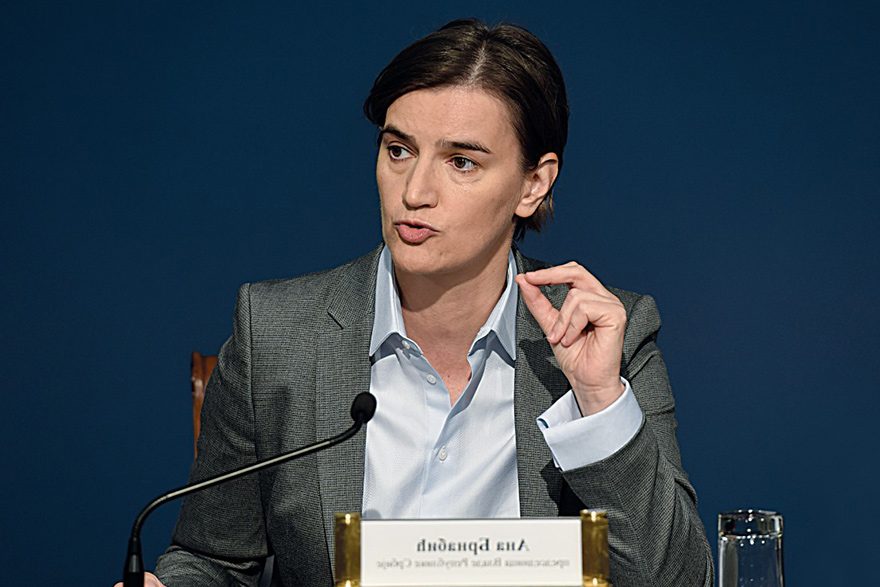We must continue to confront the changes brought about by the fourth industrial revolution. That’s precisely why I insist on the importance of digital transformation, which is not limited only to the introduction of IT solutions, but rather represents a process that permeates all spheres, changes the way we live and work, in culture, medicine, agriculture, healthcare, communications and all other areas
Building on the successes of the previous Serbian government, which successfully implemented fiscal stabilisation, Prime Minister Ana Brnabić ’s cabinet has continued working on structural reforms and creating conditions for accelerated economic growth.
“Our first aim is to improve the business environment,” says Prime Minister Brnabić in this interview for CorD.
This is a complex job that implies the modernisation of state administration through the introduction of e-governance, education reform that should lead to the creation of professional personnel who will more easily engage in work processes thanks to their knowledge and skills, and to encourage the capacity for innovation and the introduction of advanced technological solutions to the economy.
“We create conditions for the development of knowledge-based and innovation-based economies because that is precisely our development opportunity,” says PM Brnabić.
By year’s end, a new industrial policy strategy should be expected. “We want to define, through dialogue with the economic and scientific community, areas in which we have the capacity to offer competitive and innovative products and services to the global market,” says CorD’s interlocutor.
Adopting this strategy is a formal condition for closing EU accession negotiations on Chapter 20, but Brnabić says that the Government isn’t only interested in fulfilling its obligations in the European integration process, but is rather primarily interested in seriously considering this issue with the aim of ensuring a better future for Serbian citizens.
Apart from that, note our interviewee, the Government is dedicated to intense reform processes in the area of rule of law, public administration, tax administration, media freedom and dialogue with civil society. “All these processes include the public and experts because we want to have the understanding with them in reforming these areas,” notes PM Brnabić.
Does the Government have sufficient resources and professional capacity to devote itself fully to the demands set by the new agreement with the IMF?
The successfully completed previous arrangement with the IMF, for which we receive plenty of praise and which now serves as an example to other countries, as well as the continuation of responsible and sustainable fiscal policies, clearly show that the Government is capable and has the capacity to implement reforms.
The IMF uses its experience from Serbia as an example of a successful consolidation of public finances in other countries. That’s the great acknowledgement for every country. The new arrangement with the IMF is of an advisory nature and differs from all previous ones.
Through this arrangement, the Government of Serbia will continue to cooperate with the IMF on the further implementation of structural reforms.
The aim of the new arrangement is to ensure higher and sustainable GDP growth and higher earnings for the citizens of Serbia, which is fully in line with the priorities of this Government, so it is in our interest for this arrangement to be implemented successfully.
One of the biggest issues is to find permanent solutions for public and state enterprises. According to your assessment, to what extent is the Government of Serbia on the road to making progress in this area?
Significant progress has already been made. Better planning and control of work resulted in us achieving net profits of RSD 23.7 billion for public enterprises in 2017, in which 31 of 37 public companies operated positively. This is a significant shift compared to 2014 when we had losses of about 65 billion dinars.
 Moreover, good and lasting solutions were found for some of the largest state-owned enterprises. Following the successful resolving of the Steelworks in Smederevo, we brought investors for former giants like Magnohrom, IMT, Galenika, and successfully found a strategic partner for RTB Bor.
Moreover, good and lasting solutions were found for some of the largest state-owned enterprises. Following the successful resolving of the Steelworks in Smederevo, we brought investors for former giants like Magnohrom, IMT, Galenika, and successfully found a strategic partner for RTB Bor.
Although all of this seemed like an impossible mission just a few years ago, we’re demonstrating that commitment and responsibility yield results. We continue to work on solving these problems and solving the issues of companies like Ikarbus, BIP, Ravanica, FAM Kruševac, the Valjevo Brewery and others. This and the previous government take care of our country’s strategic resources by finding partners that not only retain jobs but also incorporate investments and the improvement of operations into their business plans.
Although everything seemed like an impossible mission just a few years ago, thanks to our commitment and responsibility we’ve succeeded in finding good and lasting solutions for some of the biggest stateowned enterprises
In your opinion, when will the Government be in a position to deal, to its full capacity, with creating conditions for the building of a new economy in Serbia?
We are working actively to create the conditions for building a new economy. Here I’m primarily referring to a better business climate, a well-regulated and efficient state administration, education that prepares personnel for the jobs of the future and an economic policy that stimulates innovation, research and development.
Our first goal is to improve the business environment. We’ve improved 50 places on the list of the World Bank’s Doing Business Index in the last four years (2014: 93rd place, 2018: 43rd place). We’re working actively on the reform and modernisation of state administration through the introduction of e-governance, in order for us to have an efficient public administration in the service of citizens and business, which will ease operations, increase efficiency and reduce corruption.
We’re working on the modernisation of education through the reform of curricula, the introduction of computer programming, entrepreneurship, financial literacy and the introduction of dual education, in order to prepare our youth as best as possible for the increasingly demanding labour market. We are also considering a set of measures to even further stimulate innovation and the creation and use of new technologies. These are just some of the steps that, over the long-term, create conditions for knowledge-based and innovation-based economies, as that is precisely our development chance.
We must continue to confront the changes brought about by the fourth industrial revolution. That’s precisely why I constantly talk about and insist on the importance of digital transformation, which is in no way limited only to the introduction of IT solutions, but rather represents a process that permeates all spheres, changes the way we live and work, in culture, medicine, agriculture, healthcare, communications and all other areas.
What is your approach when it comes to formulating industrial policies?
A new industrial development strategy is currently being developed, which should represent the backbone of our policy in this field. It’s important for us to orientate ourselves towards a high technology economy, in order for us to become more competitive and to catch up with the economically most developed countries. We also need to better utilise the resources we have and create added value out of them.
It should be emphasised that the development of a new industrial policy is not only a formal condition for closing negotiating Chapter 20 with the EU but also a document with which we need to define how we plan to reform the domestic economy. We don’t just want to fulfil the condition for closing the chapter, rather we’re dealing seriously with this issue with the aim of creating a better future for our citizens.
The new industrial policy strategy is significantly linked with the adoption of a smart specialisation strategy, which we’re working on diligently and we expect to have the first draft of this document by the end of the year. The goal of this strategy is to define, through dialogue with the economic and scientific community, areas in which we have the capacity to offer competitive and innovative products and services to the global market. Innovation is a driver of social development.
The indirect influence that the work of the Tax Administration has on the competitiveness of our economy is huge and its transformation can considerably accelerate the modernisation of our economy, but it would be unrealistic to expect changes to occur overnight
The tax system, Tax Administration and the efficiency of public administration are assessed by domestic and foreign investors as a key obstacle to better operations. Why, despite the intensive professional assistance of many donors, does Serbia still not have a better rating in these areas?
The goal of transformation is an efficient Tax Administration with a modern, integrated information system that supports business processes that are simple, understandable and harmonised with the best international practices. The process of transforming a system like the Tax Administration is long and complex. In cooperation with the IMF, reforms should be conducted by 2023, although we expect to finalise this process much earlier. We want to enable an increase in tax revenue and better tax discipline.
 This process is one of the cornerstones of structural reforms. The indirect influence that the work of the Tax Administration has on the competitiveness of our economy is huge and its transformation can considerably accelerate the modernisation of our economy. Simpler and predictable confirmation and payment of taxation will encourage the opening up of new enterprises and, in parallel with reducing the scope of the grey economy, this reform will contribute to stabilising public finances.
This process is one of the cornerstones of structural reforms. The indirect influence that the work of the Tax Administration has on the competitiveness of our economy is huge and its transformation can considerably accelerate the modernisation of our economy. Simpler and predictable confirmation and payment of taxation will encourage the opening up of new enterprises and, in parallel with reducing the scope of the grey economy, this reform will contribute to stabilising public finances.
We’ve so far established a new organisational structure of the Tax Administration, reduced the number of branches from 178 to 78, with the tendency of further reduction and striving to strengthen them, while centralising collection and control in order to increase efficiency in work. Digitisation is an integral part of the reform of this important institution, so since the beginning of this year, all tax returns have been transferred into electronic form, which has enabled taxpayers to file all tax applications through the portal of the Tax Administration.
The changes we’re implementing are systemic and comprehensive and require a lot of time. Considering how many years have passed since these things were accounted for and how long the system was in a state of disrepair, it is unrealistic to expect all the mistakes dating back several decades to be remedied in two, three or five years. It is an encouraging fact that many results are now already visible. Throughout the entire course of the reform of the administration, as a responsible government, we have been strengthening the tax culture of our citizens and I will always repeat that the highest patriotic act is the payment of taxes.
It seems that, if we gauge progress on the basis of the opening of chapters, Serbia hasn’t advanced particularly far in the field of European integration. Does this bring into question Serbia’s status as the first possible candidate for membership? Has the original hope that this might happen fallen away on both sides?
I wouldn’t agree with your statement. Earlier this year, the European Commission clearly presented Serbia as the country most likely to become a full member of the European Union by 2025, as the potential date of accession. Serbia has to date opened 14 of the 35 negotiating chapters and temporarily closed two.
 There are currently three chapters that are fully ready to open – Chapter 9, concerning financial services; Chapter 18, which relates to statistics; and Chapter 17, linked to the economic and monetary union – which we expect to be open by the end of this year. All of these chapters are related to specific results in the implementation of economic reforms.
There are currently three chapters that are fully ready to open – Chapter 9, concerning financial services; Chapter 18, which relates to statistics; and Chapter 17, linked to the economic and monetary union – which we expect to be open by the end of this year. All of these chapters are related to specific results in the implementation of economic reforms.
I believe that the measure of success in European integration should not only be represented by the speed of opening chapters and their number but rather the essence of this adjustment is in the reforms and modernisation of the society that we conduct.
The Serbian Government is committed to intense reform processes in the areas of the rule of law, public administration, tax administration, freedom of the media and dialogue with civil society.
The public and experts are included in all of these processes because we want to have an understanding with them in reforming these areas.
I believe that the measure of success in European integration should not only be represented by the speed of opening chapters and their number, but rather the essence of this adjustment is in the reforms and modernisation of the society that we conduct
The debate on constitutional changes and judicial reform was the subject of a recent conversation I had with representatives of civil society organisations at a meeting with the National Convention on the EU. The European Commission has just praised Serbia’s progress in the field of constitutional reforms, as well as the formation of a working group and a dialogue team that’s working on the drafting of the media strategy. I would particularly emphasise the government’s cooperation with media and journalists’ associations and the open dialogue that the Government has, after many years, with representatives of the media. That’s a newly established format that didn’t previously exist in political practice in Serbia.
The government that I head has set full membership in the European Union as a strategic goal. Serbia is dedicated to EU integrations and shares European values and ideas. However, I must clearly highlight that the point of all these reforms and the alignment of our legislation with EU law are not the goal in and of themselves. The end result of this process will be a better standard of living for the citizens of Serbia, and EU membership will come as a result of these reforms.
| DEDICATION
The Serbian Government is committed to intense reform processes in the areas of the rule of law, public administration, tax administration, freedom of the media and dialogue with civil society |
COMPETITIVENESS
To become more competitive and to catch up with the economically most developed countries we want to orientate ourselves towards a high technology economy |
RESPONSIBILITY
This and the previous government take care of our country’s strategic resources by finding foreign partners that not only retain jobs but also invest and improve operations |
|---|